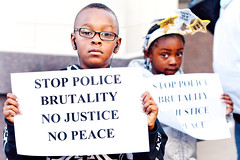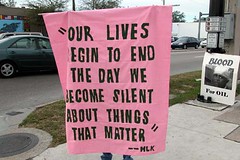Recent Social Issues Shows A Lack Of Leadership Skills
Posted by Mitch Mitchell on Dec 15, 2014
I've been pretty quiet here about some of the things that have been going on lately regarding what I'll term diversity issues. I don't think I need to mention the names of any cities or any individuals or any of the particular actions for anyone to know what's been going on.
 |
I have given my opinion and shared thoughts and information on other platforms, including one of my YouTube channels. Self expression during troubled times is a right of all of us and I've had some feelings I've needed to express. It's that part of the diversity issue I want to address today because it's relevant to business and leaders who might not know how to handle things with some employees right now.
The first thing to get out of the way is that when events like this occur, and it seems to involve race, religion, or any other thing that categorizes us, it's not really an issue just for those groups of folks... it's a "people" issue, which means it's everyone's issue. You can try to dodge the issue thinking it has nothing to do with you, or you might feel it's only your issue and no one else can understand, and you might be right... but it's not fully correct.
The thing with an issue like this is how people in general sometimes act when they assume positions of power, and how other people react when they have to view people in positions of power. Whereas the recent events all seem to point at one thing over another, truth be told this isn't anything that hasn't happened in the past, and it's not anything that hasn't happened to other groups of people.
All we have to do is look back at our history, and not even all that far back. The 60's were replete with lots of civil action against authority, trying to get rights for people who'd been subjugated in some fashion. There were civil rights protests, protests against the war in Vietnam, protests against police brutality in Chicago and other cities... over and over these things happened. And it wasn't just black people who were victims of the police; people of all religions and all racial backgrounds were beaten and arrested and killed.
This isn't a condemnation of the police either. I acknowledge that they have a tough job to do overall. "Protect and serve" means that when people are in trouble, being robbed, being hurt or having to figure out what kind of action to take against someone who might be looking to make a larger statement of some kind, that we look towards law enforcement to come up with the solutions because they have the training and the background to take on the challenge; it's their job.
What it is instead if a way of relating the problem with police to the problems of many leaders overall, that being the lack of proper training.
One of my laments about health care leadership is that most of the people who are promoted into positions of leadership often don't have any real leadership training but lots of technical training. Having the ability to know the ins and outs of medical issues doesn't immediately qualify someone for leadership.
The same goes for law enforcement and, indirectly, the military. Sure, those at the top get some leadership training many times, but leadership isn't a trickle down process that someone take in by osmosis.
Without as much training in leadership and people skills as there is with skills with firearms or physical take downs we get people who are trained to kill without learning how to process situations like true leaders do so they can make proper decisions.
 |
I know someone's probably thinking "front line soldiers and police officers aren't real leaders"; oh really? When there's a situation and a cop arrives on the scene who's leading at that moment? When a soldier kicks in a door and points a rifle at someone or many people who's in the leadership at that time? In those types of situations wouldn't it help if someone had some leadership training that could help them make proper decisions instead of rash decisions?
The problem with most of the situations we've seen lately is that none of these situations were critical when the incidents occurred. In only one incident has an officer said he felt like he was in danger, yet early on that particular officer, who, it turns out, had limited experience and, if protocol had been followed, shouldn't have been out on call by himself, had no fear and wasn't under any threat. If there's no real threat doesn't that mean evaluation skills were lacking? Isn't that a byproduct of teaching someone leadership skills?
That all the recent victims have been of one race has led to protests and riots across the country has been distressing, and it's easy to get caught up in that. But since it's something that keeps happening, and has happened for multiple decades now, and has involved people of all ages and all backgrounds, isn't it time to look for real solutions to try to stop these things? When all is said and done, isn't all of this a leadership problem?
As a disclaimer I'll admit that I had to work through some anger to come to this conclusion. I don't want to hate the police; I don't want to fear the police or mistrust the police. Instead of just castigating someone and ranting and raving on a continuous basis I thought it was time to discuss issues critically.
I recognize that something that's this embedded and has been for so long requires first a potential answer, then a potential solution, and finally a potential process to push things towards more positive results.
I've started the first part. It's hard to have a real dialogue unless people are ready for it. It's hard to have a productive dialogue unless there are some people in the room with leadership skills, whether they're in the lead position or not. It's hard to affect change without leaders leading the way.
So it's not simple, but I think it's workable. Anyone agree?


Mitch,
I agree with you 100 percent about the lack of leadership. It’s practically non-existent EVERYWHERE. You talk about power and leadership. Having power does not, in my opinion, make you a leader so based on that notion, the police are not leaders. They should be but they are not. Somewhere along the way, our so-called government leaders gave them too much power and we all know too much power can lead to abusive behavior. Turn on your nightly news and see what I’m talking about.
Perhaps if the police thought of themselves as true leaders, they would have a better rapport with the community. Perhaps if we could vote on keeping officers or getting rid of them they would solve some major issues.
Nice, thought-provoking post.
Thanks Bev. It’s because they have the authority to take over a situation that I call them defacto leaders in some moments and why I believe they all should get leadership training. Unfortunately, I know it’s not going to happen any time soon.